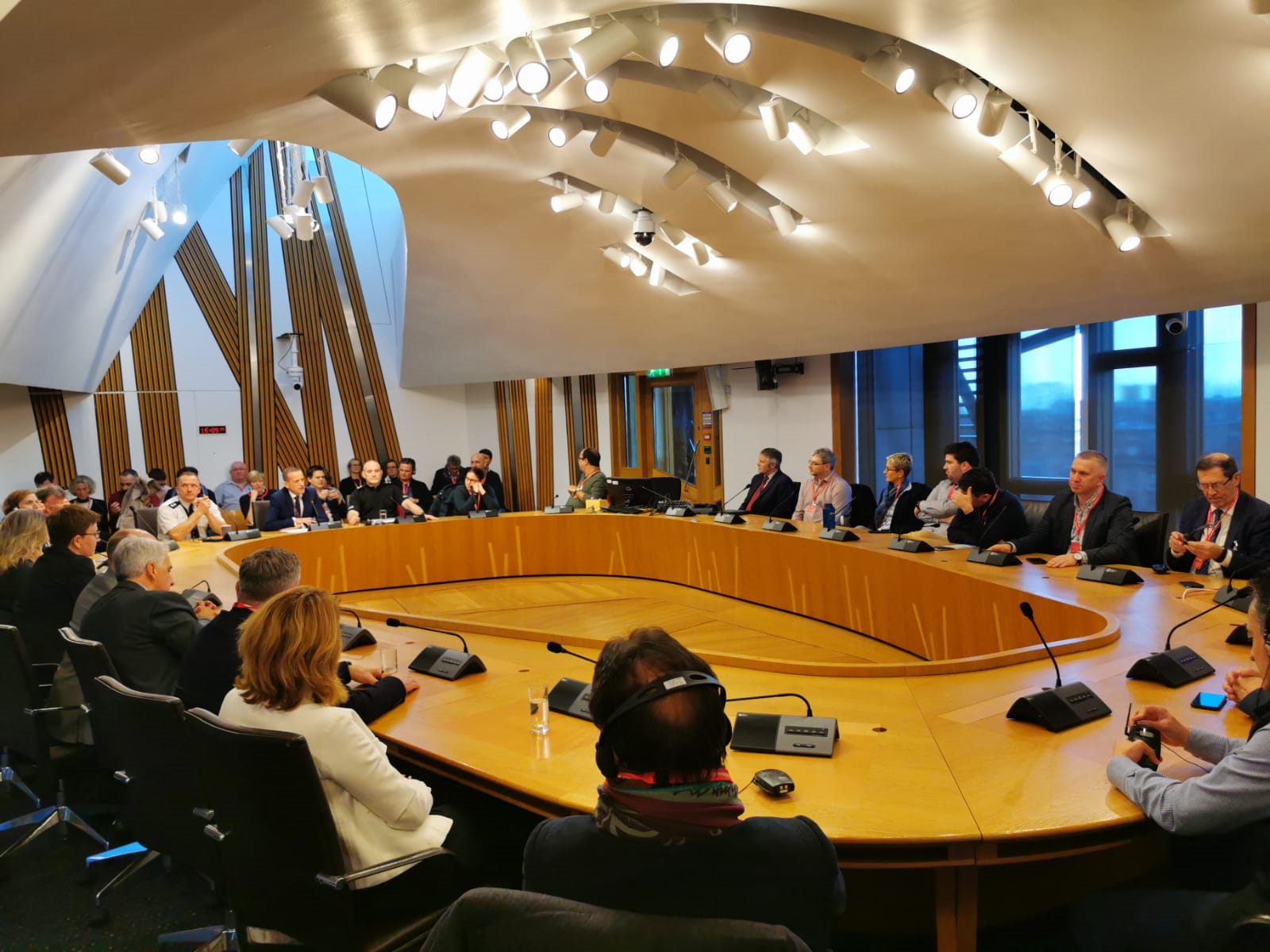Edinburgh, United Kingdom, February 2020 – The partners of the PACTESUR project, which is led by the French city of Nice, as well as the associate experts, took part in the project’s second yearly meeting in Edinburgh (GB), on 20-21 February. The meeting was focused on transnational threats such as terrorism, organised crime and cyber-crime.
> Exchanges with Police Scotland… Hosted by the Edinburgh City Council, the seminar was introduced by the Deputy Chief Constable of Police Scotland, Malcolm Graham. He stressed the importance of having a partnership strategy with all the stakeholders involved in the prevention of this type of transnational crime. Mariusz Czepczyński, professor at the department of Space Management of the University of Gdańsk (PL), made a presentation about the multidimensional threats against public spaces and how they affect the way they are managed (for example in case of panic).
> … and among cities
A panel discussion followed with representatives of three British cities: Edinburg, Leeds and London. They described their respective protection schemes against inter-communal threats and the cooperation and information-sharing systems used by British agencies involved in counter-terrorism. The participants then took part in a workshop on the threats posed on public spaces by terrorism, organised crime and cyber-crime. They identified the most important threats and the areas that need to be worked on as a matter of priority.
> Risks that have been identified and proposed responses
Concerning terrorism, the participants identified the feelings of insecurity experienced by citizens in the wake of an attack; the fact that these attacks are unpredictable, and the danger of over-legislating and curbing individual freedoms. Among the responses they suggested were improved public communications; developing the general public’s resilience, and harmonising legislations throughout the EU. Concerning cybercrime, participants identified the risk of a total blackout of communication systems; the dissemination of fake news, and economic crime which allows, in part, terrorist organisations to fund their activities. The proposed responses include increasing investment in communication systems, raising awareness among citizens, and exchanging information among different levels of government and among law enforcement agencies. Lastly, concerning organised crime, the main risks identified are corruption and the infiltration of the local economy, as well as the degradation of public spaces. Among the responses put forward: naming a person in charge within the police; increasing the supervision of local businesses by local authorities; multiplying exchanges among local and international authorities, and establishing local observatories.
> Visit of the Scottish Parliament’s security system
At the end of the first day, the participants visited the Scottish Parliament, where a presentation was made on the security system and the main aspects of the Scottish legislation on the protection of public spaces.
> Legal and regulatory framework
The first session of the second day was dedicated to the legal and regulatory framework of the countries represented in the project’s consortium. Chaired by the Executive Director of the Italian Forum for Urban Security (FISU), Gian Guido Nobili, the panel gathered experts from Belgium, France and Italy. Each European country has a distinct legal framework, which means that responses to crises vary from one country to the other. This led the meeting participants to discuss the idea of a common European framework. One of the project’s deliverables is a comparative study of the various legislations in force in European countries, which will include recommendations for national governments and European institutions.
> Examples of practices from the United Kingdom
The second session was focused on the presentation of practices put in place in the United Kingdom: the use of physical barriers in London to prevent vehicle-ramming attacks; the Scottish Multi-Agency Resilience Training & Exercise Unit (SMARTEU); the London Metropolitan Police’s SERVATOR project to deter, detect and disrupt a range of criminal activity, including terrorism, and lastly the UK’s CONTEST counter-terrorism strategy.
> Working on the project’s final publication
In the last session, the participants worked on the guidebook that will be published at the end of the project. They notably reviewed the case studies that will be presented by the associated cities and the “action fact sheets” that will provide advice and tools on a range of topics, such as crisis communication. These fact sheets will be disseminated at the end of the project.
About PACTESUR
The PACTESUR project aims to empower cities and local actors in the field of security of urban public spaces facing threats, such as terrorist attacks. Through a bottom-up approach, the project federates local decision makers, security forces, urban security experts, urban planners, IT developers, trainers, front-line practitioners, designers and others in order to shape new European local policies to secure public spaces against terrorist attacks
Contact
- Tatiana Morales, Programme Manager: morales@efus.eu
- Martí Navarro Regàs, Programme Manager: navarroregas@efus.eu
- Marta Pellón Brussosa, PACTESUR Communication Officer: pellonbrussosa@efus.eu





